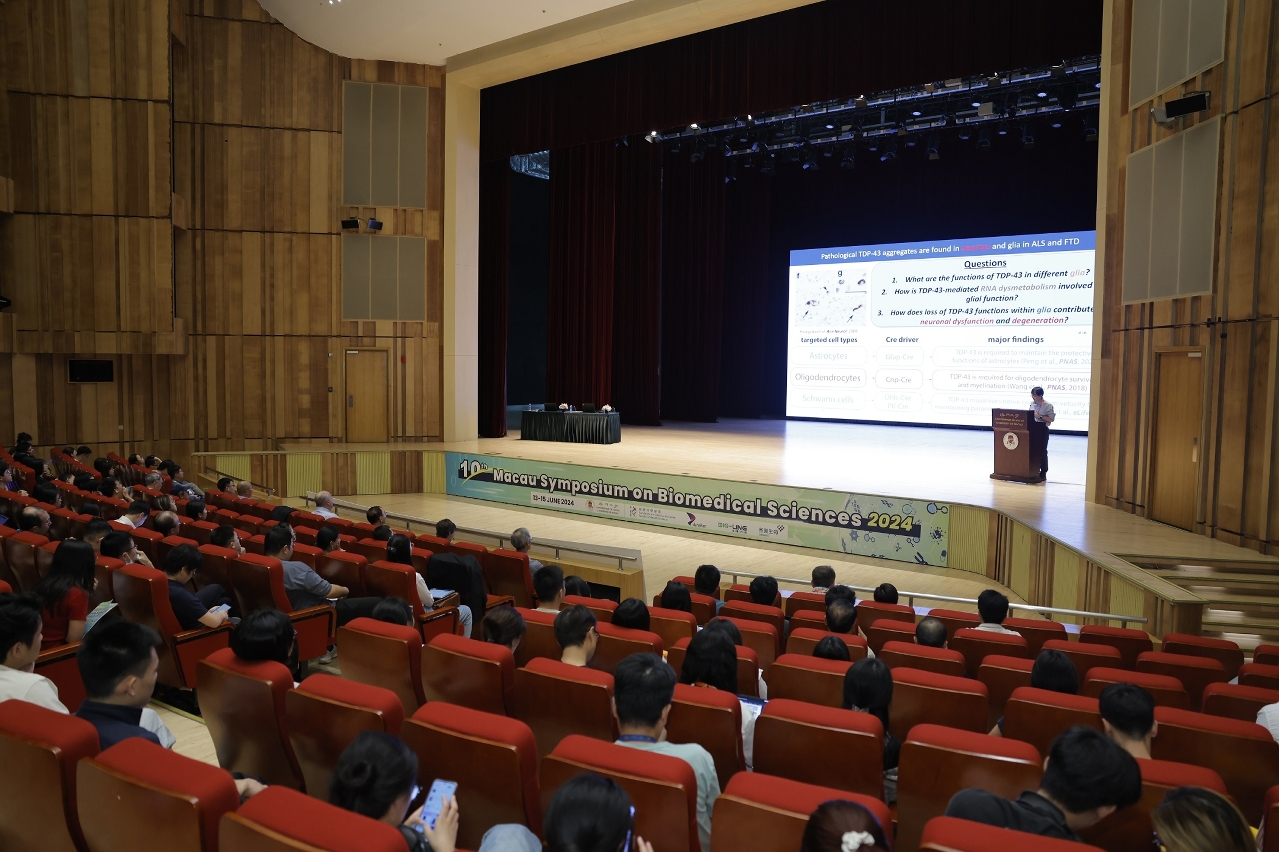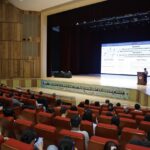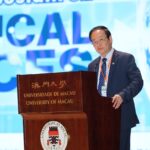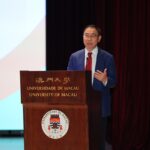 UM holds the 10th Macau Symposium on Biomedical Sciences
UM holds the 10th Macau Symposium on Biomedical Sciences
The opening ceremony of the 10th Macau Symposium on Biomedical Sciences, organised by the Faculty of Health Sciences (FHS) of the University of Macau (UM), was held today (14 June) at UM. The symposium has brought together more than 200 experts, researchers and students in the field of biomedical sciences from around the world. Under the theme ‘Pushing the Limit’, the three-day event features 42 academic talks on cutting-edge research and innovative technologies in biomedical sciences.
Ge Wei, vice rector of UM, said in his speech that UM has continuously improved its teaching and research quality and actively engaged in research innovation and industry-academia collaboration, achieving remarkable results. He also added that UM’s international reputation continues to grow. In the Times Higher Education (THE) World University Rankings 2024, UM is ranked among the top 200 in the world for the first time, and it has also made an impressive leap into the top 200 in the clinical and health subject ranking. He expressed hope that the symposium will provide a platform for researchers from around the world to engage in in-depth discussions on biomedical sciences, break through the limits in the field, and promote cutting-edge research and industry-academia collaboration.
Chuxia Deng, dean of FHS, said that the symposium features 1 keynote lecture, 4 plenary lectures, and 37 session talks, enabling domestic and foreign experts to hold in-depth discussions on cutting-edge topics in biomedical sciences. These topics include diagnostic imaging and drug delivery, cancer immunology, personalised cancer treatment, tumour microenvironment and metastasis, metabolism, signalling networks and therapy, developmental induction, single-cell analysis, stem cells, epigenetics, infectious diseases, genome editing and reprogramming, and new technologies.
In the keynote lecture, Wang Xiao-Fan, world-renowned cancer biologist, foreign member of the Chinese Academy of Sciences and Donald and Elizabeth Cooke Distinguished Professor at Duke University, discussed novel mechanisms by which tumour cells evade immune surveillance as well as clinically relevant strategies for anti-cancer immunotherapy. In addition, four professors shared their research results during the plenary session: Cantas Alev, professor at Kyoto University, talked about the reconstitution of human axial development and diseases in vitro; Manuel Valiente, head of the Brain Metastasis Group of the Spanish National Cancer Research Centre, discussed strategies to challenge brain metastasis lethality; Yu Di, director of the Ian Frazer Centre for Children’s Immunotherapy Research at the University of Queensland in Australia, presented his research on the interactions between systemic metabolism and ferroptosis that shape T-cell function in immunity; Zhao Keji, director of the Systems Biology Center at the National Heart, Lung, and Blood Institute of the US National Institutes of Health, explained the detection, function and regulation of chromatin loops.
The session talks cover a range of topics, including stem cells, gene and cell therapy; fungal biology, infection and application; bioimaging and biomaterials; chromatin and transcriptional regulation in disease; and cancer research. Domestic and foreign experts present the latest advances in their respective countries and regions and lead in-depth discussions. In addition, over 160 outstanding posters are showcased at the symposium. The poster review committee will assess all the posters and select some remarkable entries for the Best Poster Awards.
This is the tenth edition of the Macau Symposium on Biomedical Sciences since its inception in 2014. It aims to provide an academic platform for experts and scholars in the field of biomedical sciences from around the world, in order to strengthen research collaboration and promote biomedical innovation and development.
Guests attending the opening ceremony included Chan Tai Ip, deputy director of Kiang Wu Hospital; Tam Sio Wa, head of the Division of Tertiary Educational Cooperation and Exchange of the Education and Youth Development Bureau; Chan Tak In, head of the Division of Chemical Medicines and Devices of the Pharmaceutical Administration Bureau; Pang Fong Kuong, chief of service of Conde S. Januário Hospital; Lam Oi Ching, associate dean of the Faculty of Health Sciences and Sports at Macao Polytechnic University; Zhu Yi Zhun, director of the School of Pharmacy at Macau University of Science and Technology; Leong Sok Man, executive officer of the Research Management & Development Department at Kiang Wu Nursing College of Macau; and Chong Hong Heng, president of the Macau Association of Precision Medicine. UM representatives who also attended the event included Rui Martins, vice rector of UM; Yu Jun, dean of the Faculty of Business Administration; Xu Cheng-Zhong, dean of the Faculty of Science and Technology; Tang Zikang, director of the Institute of Applied Physics and Materials Engineering; Chen Xin, director of the Institute of Chinese Medical Sciences; Pang Chap Chong, dean of students; and Wang Ruibing, director of the Global Affairs Office.




